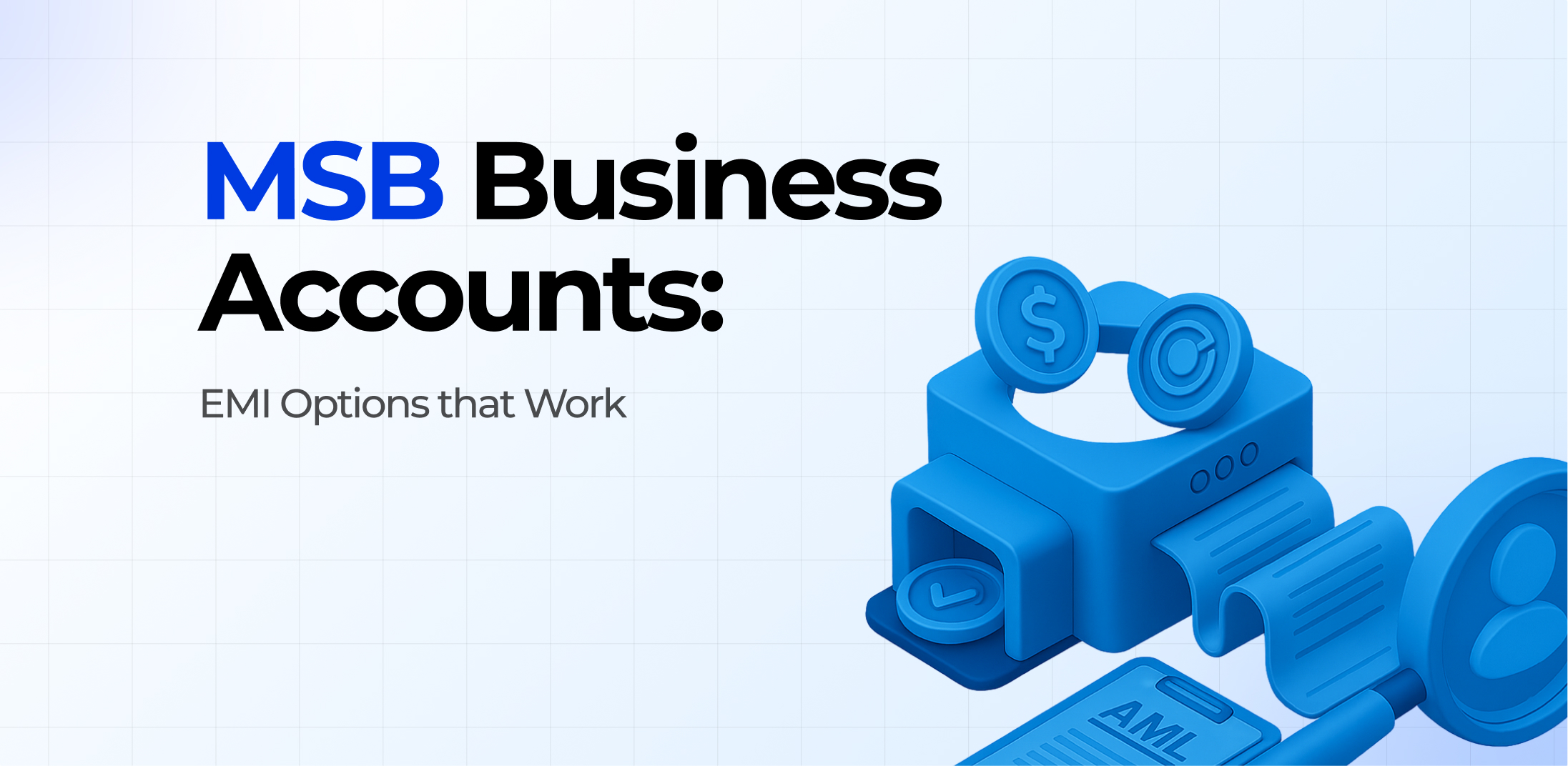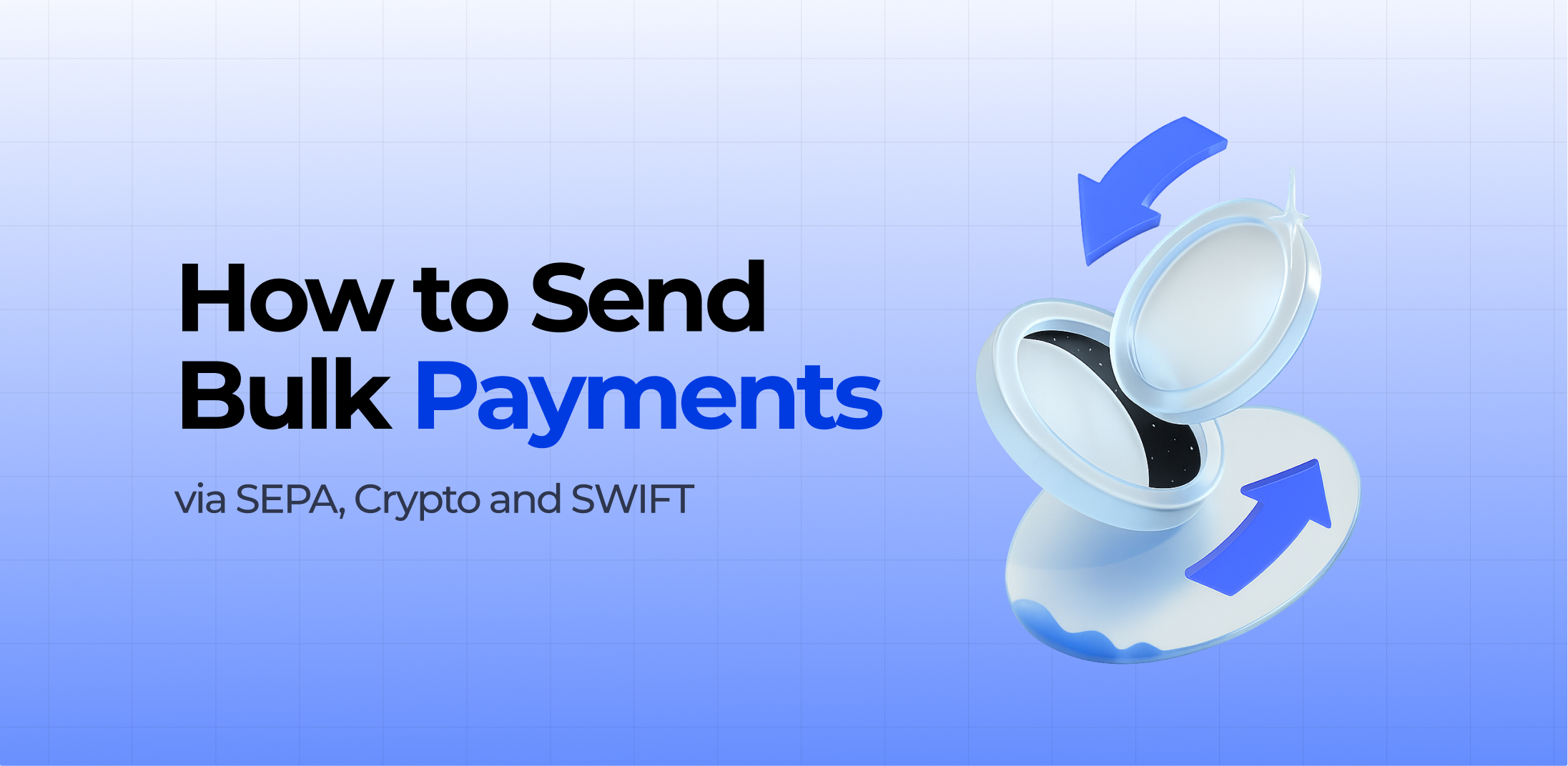Money Services Businesses (MSBs) operate across sectors like currency exchange, international money transfers, digital payments, and increasingly, cryptocurrency services. As key enablers of global money movement, MSBs contribute significantly to financial accessibility and transactional speed. Yet, despite their importance, these businesses often face major roadblocks when dealing with traditional banks.
Perceived as high-risk entities, MSBs frequently encounter account rejections, prolonged onboarding procedures, and burdensome compliance checks—creating operational uncertainty and inefficiency. To overcome these challenges, many MSBs are turning to Electronic Money Institutions (EMIs). These licensed financial entities provide specialized, tech-driven solutions tailored to the complexities of MSB operations.
With features such as individual IBANs, support for multiple currencies, and instant payment capabilities, EMIs are redefining the landscape of MSB payment solutions – Licensed Business Payments. In the sections that follow, we’ll examine why traditional banks fall short for MSBs, how EMIs fill this gap, and which services matter most.
Why MSBs Struggle with Traditional Banking
Although MSBs are integral to the global financial ecosystem, they frequently encounter major challenges with traditional banking partners. Strict compliance protocols, sudden account freezes, and a general reluctance to support high-risk industries leave many MSBs underserved. As a result, businesses are increasingly turning to more adaptable solutions like an MSB EMI account designed for their unique demands.
High-Risk Classification and Rejection Rates
Conventional banks frequently label MSBs as high-risk due to their association with large-scale fund transfers, remittance operations, or cryptocurrency activity. This viewpoint is largely influenced by heightened regulatory pressure and concerns surrounding AML compliance. Consequently, even well-regulated and licensed MSBs often encounter major roadblocks, such as unexplained account denials, unexpected freezes, or abrupt closures.
These issues can severely disrupt business continuity and erode client confidence. To avoid such setbacks, many operators turn to more accommodating providers that offer licensed MSB banking options or a reliable remittance business account tailored to the unique needs and risk profiles of the sector.
Regulatory Burdens and Compliance Friction
Money Services Businesses (MSBs) encounter intense regulatory demands, especially in relation to Know Your Customer (KYC) and Anti-Money Laundering (AML) obligations. These frameworks require detailed documentation, continuous oversight, and strict reporting. Many traditional banks are either ill-equipped or unwilling to handle the complexities involved in onboarding MSBs. This often leads to prolonged processing times, rejections, or excessive compliance hurdles.
Limited Product Fit
Conventional banks usually provide generic business account solutions that fall short of meeting the operational demands of Money Services Businesses (MSBs). These financial products are built for standard companies—not for firms handling large volumes of transactions and rapid fund flows. MSBs frequently encounter issues such as delayed international payments, insufficient multi-currency functionality, and the absence of real-time transaction management tools.
EMIs: A Game-Changer for MSB Banking
Electronic Money Institutions (EMIs) are reshaping the way Money Services Businesses (MSBs) handle their financial workflows. In contrast to conventional banks, EMIs deliver flexible, technology-focused services specifically designed for fast-paced, high-risk industries.
They offer streamlined onboarding, robust multi-currency capabilities, and real-time financial insights—features that empower MSBs to boost efficiency, maintain regulatory compliance, and expand internationally. As the financial sector evolves, EMIs stand out as strategic partners for sustainable MSB growth.
What Is an EMI and How It Differs from a Bank?
An Electronic Money Institution (EMI) is a licensed financial entity authorized to issue electronic money, hold client funds, and provide payment services. Regulated under financial authorities such as the FCA or national regulators in the EU, EMIs can issue IBANs, facilitate SEPA and SWIFT transfers, offer business cards, and support foreign exchange (FX) transactions. Unlike traditional banks, EMIs do not engage in lending activities, which reduces regulatory overhead and allows for faster, more flexible onboarding.
Why EMIs Are More Open to MSBs
EMIs operate using fintech-native compliance frameworks that emphasize automation, real-time monitoring, and adaptability—positioning them as ideal partners for Money Services Businesses (MSBs). Unlike traditional banks, which often avoid high-risk sectors, EMIs are purpose-built to support industries like crypto, remittances, and currency exchange subject to compliance and licensing requirements.
Their API-first architecture enables smooth integration with business systems, while digital onboarding minimizes delays and manual paperwork. This forward-thinking model allows EMIs to evaluate and manage risk with greater precision.
Core Features MSBs Should Look for in EMI Business Accounts

EMI business accounts vary widely, particularly when it comes to serving Money Services Businesses with intricate requirements. To achieve optimal efficiency, regulatory compliance, and growth potential, MSBs must focus on selecting accounts that offer features tailored to their specialized needs. The key capabilities outlined below are crucial for identifying the ideal EMI provider.
Dedicated IBANs for Transparent Operations
Dedicated IBANs enable Money Services Businesses to distinctly isolate client funds from their own operational accounts, promoting clear and well-structured financial oversight. This separation safeguards client assets while streamlining compliance processes, making it easier to monitor transactions and generate accurate reports. By using dedicated IBANs, MSBs can better fulfill stringent KYC and AML obligations, minimizing risks and building greater confidence among regulators and clients.
Multi-Currency Accounts
For Money Services Businesses involved in forex or international payments, multi-currency accounts are vital. They enable MSBs to store and operate with various currencies at once, minimizing the frequency of currency conversions. This reduces extra fees and processing delays, allowing quicker and more economical cross-border transactions.
Real-Time FX Services
Real-time FX services provide Money Services Businesses with access to competitive and transparent foreign exchange rates. This instant visibility allows MSBs to monitor and manage currency spreads more effectively, directly impacting their profitability. By leveraging up-to-date FX pricing, MSBs can make informed decisions, reduce costs associated with unfavorable rates, and optimize revenue from currency conversions in a fast-paced international market.
Compliance and Regulatory Alignment
For Money Services Businesses, adhering to regulatory standards is more than a legal necessity—it’s essential for building trust and ensuring long-term success. Managing intricate regulations such as KYC, AML, and data privacy requires strong infrastructure and vigilant oversight.
Partnering with an Electronic Money Institution (EMI) focused on regulatory compliance enables MSBs to minimize risks, prevent fines, and confidently conduct business across various regions. The features below demonstrate how EMIs help MSBs navigate and stay ahead of compliance demands.
AML/KYC Tools Built for MSBs
Electronic Money Institutions serving Money Services Businesses provide automated onboarding solutions that simplify customer verification while ensuring full compliance with AML and KYC regulations. Utilizing sophisticated technologies, these platforms perform dynamic risk assessments to accelerate reviews and enhance precision. Real-time transaction monitoring further identifies potentially suspicious activities, allowing for swift action and regulatory reporting.
Regulatory Reporting Support
A number of Electronic Money Institutions incorporate sophisticated RegTech tools to offer Money Services Businesses instant regulatory reporting features. These systems automate the gathering and filing of compliance data, guaranteeing accuracy and promptness in meeting changing regulatory standards. By cutting down on manual input and reconciliation tasks, EMIs reduce errors and lighten administrative workloads for MSBs. This automation simplifies continuous reporting and strengthens audit readiness, enabling swift responses to regulatory requests.
Case Studies or Example Use Cases

Examining real-life examples reveals how Money Services Businesses effectively utilize Electronic Money Institutions to navigate banking obstacles. These case studies provide insight into how EMI services drive enhanced compliance, streamline operations, and support international growth. The use cases below highlight the measurable advantages EMIs offer to businesses operating in high-risk financial markets.
Crypto MSB Working with an EMI
A global crypto exchange collaborated with an Electronic Money Institution to enhance its fiat on- and off-ramp capabilities. Utilizing the EMI’s infrastructure—such as dedicated IBANs, multi-currency support, and instant FX tools—the platform enabled fast, cross-border deposits and withdrawals for its users. This partnership significantly improved regulatory compliance, minimized processing times, and delivered a streamlined, compliant solution for converting between fiat and cryptocurrency across various markets.
Remittance Provider Scaling with EMI Services
An international remittance provider collaborated with an Electronic Money Institution to enhance the efficiency of its cross-border payment infrastructure. With access to multi-currency accounts, the company gained better control over liquidity in key markets, minimizing frequent conversions and associated costs.
The EMI’s integrated API and real-time reporting tools also simplified reconciliation and compliance tracking. This partnership enabled the remittance firm to scale quickly while keeping operations cost-effective and fully aligned with regulatory standards.
Currency Exchange Kiosk Using EMI Tools
A mid-sized currency exchange kiosk teamed up with an Electronic Money Institution to upgrade and streamline its financial processes. Through the EMI’s digital platform, the business accessed live FX rates, efficient fund transfers, and integrated compliance automation.
This transition reduced reliance on manual tasks and minimized operational errors. The enhanced capabilities enabled the exchange to deliver quicker, more transparent services while maintaining full regulatory compliance—improving overall performance and customer confidence.
How to Choose the Right EMI Partner

Choosing the right Electronic Money Institution is a key decision for Money Services Businesses aiming for sustainable growth. A strong EMI partner should combine deep regulatory knowledge with customized services, while also offering the technological infrastructure and flexibility needed to scale. Below are essential factors MSBs should consider when evaluating potential EMI providers.
Evaluate Licensing and Regulatory Status
Assessing an EMI’s regulatory status is a critical step in the selection process. Institutions licensed in Tier 1 jurisdictions like the UK or EU benefit from robust supervision and strong reputational standing compared to those based in offshore locations. Partnering with a well-regulated EMI enhances compliance reliability, builds institutional trust, and facilitates smoother integration with global financial systems.
Industry Experience with MSBs
Confirming that the EMI has substantial experience working with Money Services Businesses is crucial. A reputable EMI will showcase a portfolio of MSB clients and provide references or success stories that highlight their expertise in addressing the specific compliance challenges and operational demands faced by this high-risk industry.
Fee Transparency and Scalability
Transparent, upfront pricing on foreign exchange, account maintenance, and onboarding fees helps MSBs manage costs effectively. Additionally, EMIs should support scalability by accommodating higher transaction volumes, enabling multi-user access, and offering customizable workflows—ensuring the platform grows smoothly alongside the business’s evolving operational needs.
Conclusion: Building a Smarter MSB Infrastructure
Electronic Money Institutions equip Money Services Businesses with the agility, speed, and compliance tools necessary to succeed in today’s intricate financial landscape. By delivering customized services like automated client onboarding, multi-currency account management, real-time foreign exchange, and seamless regulatory reporting, EMIs enable MSBs to streamline operations while adhering to regulatory standards.
This innovative banking model helps MSBs break free from traditional limitations and expand confidently on a global scale. For sustained growth, MSBs must carefully choose EMI partners that match their specific risk profiles and strategic goals. Finding the right EMI collaborator is vital to unlocking growth potential and maintaining a competitive advantage in a fast-changing market.








